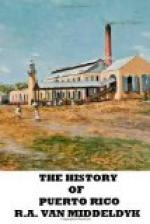Mr. Atiles refers to the premature awakening among the rustic population of this island of the procreative instincts, and the consequent increase in their numbers notwithstanding the high rate of mortality. The fecundity of the women is notable; from six to ten children in a family seems to be the normal number.
[Illustration: A tienda, or small shop.]
Intellectually the jibaro is as poor as he is physically. His illiteracy is complete; his speech is notoriously incorrect; his songs, if not of a silly, meaningless character, are often obscene; sometimes they betray the existence of a poetic sentiment. These songs are usually accompanied by the music of a stringed instrument of the guitar kind made by the musician himself, to which is added the “gueiro,” a kind of ribbed gourd which is scraped with a small stick to the measure of the tune, and produces a noise very trying to the nerves of a person not accustomed to it.
In religion the jibaro professes Catholicism with a large admixture of fetichism. His moral sense is blunt in many respects.
Colonel Flinter[63] gives the following description of the jibaros of his day, which also applies to them to-day:
“They are very civil in their manners, but, though they seem all simplicity and humility, they are so acute in their dealings that they are sure to deceive a person who is not very guarded. Although they would scorn to commit a robbery, yet they think it only fair to deceive or overreach in a bargain. Like the peasantry of Ireland, they are proverbial for their hospitality, and, like them, they are ever ready to fight on the slightest provocation. They swing themselves to and fro in their hammocks all day long, smoking their cigars or scraping a guitar. The plantain grove which surrounds their houses, and the coffee tree which grows almost without cultivation, afford them a frugal subsistence. If with these they have a cow and a horse, they consider themselves rich and happy. Happy indeed they are; they feel neither the pangs nor remorse which follow the steps of disappointed ambition nor the daily wants experienced by the poor inhabitants of northern regions.”
This entirely materialistic conception of happiness which, it is certain, the Puerto Rican peasant still entertains, is now giving way slowly but surely before the new influences that are being brought to bear on himself and on his surroundings. The touch of education is dispelling the darkness of ignorance that enveloped the rural districts of this island until lately; industrial activity is placing the means of greater comfort within the reach of every one who cares to work for them; the observance of the laws of health is beginning to be enforced, even in the bohio, and with them will come a greater morality. In a word, in ten years the Puerto Rican jibaro will have disappeared, and in his place there will be an industrious, well-behaved, and no longer illiterate class of field laborers, with a nobler conception of happiness than that to which they have aspired for many generations.




